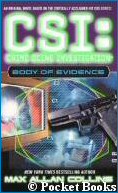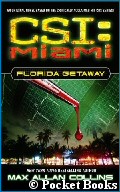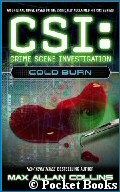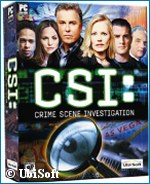CSI Files
Captain
 <font color=yellow>Max Allan Collins</font> is a name synonymous with crime writing. With works ranging from the graphic novel Road to Perdition and Dick Tracy comic strips to the Nate Heller series of novels, he has established himself as a master of the genre.
<font color=yellow>Max Allan Collins</font> is a name synonymous with crime writing. With works ranging from the graphic novel Road to Perdition and Dick Tracy comic strips to the Nate Heller series of novels, he has established himself as a master of the genre. The CSI: Crime Scene Investigation universe has now benefited from Collins' talents. He has penned three CSI novels, with a fourth, Body of Evidence, on the way in October. His first CSI: Miami book, Florida Getaway, will be published in August.
As if that wasn't enough CSI to be going on with, Collins has also written two CSI comic series and the script for UBI Soft's CSI computer game.
In this Q&A with CSI Files readers, Max Allan Collins discusses how he came to be involved with the CSI franchise, the challenges of writing for the various characters, and drops some hints about his upcoming novels. He also reveals he is currently working on the story for the second CSI computer game.
<HR ALIGN="CENTER" SIZE="1" WIDTH="45\%" COLOR="#007BB5">
Elyse: Max, thanks for doing this Q&A. How did you become involved inwriting the novels and the comics, and how many of them do you think you'lldo? Thanks.
Max Allan Collins: I was approached to do two CSI novels fairly early on - about half-way into the first season, when the show was starting to surprise people (though a lot of folks were writing the high ratings off to the Survivor time slot). I've done lots of licensing books - movie novelizations like Saving Private Ryan, The Mummy, In The Line Of Fire, etc., plus two original NYPD Blue novels - and, with my background as a mystery writer, I'm sure I seemed like a natural choice. The CSI and CBS people looked at my bio/resume, plus a number of my published novels, before I was offered the gig. I had to be approved.
I knew about the show, and had meant to watch it - I've always liked <font color=yellow>William Petersen</font> (Gil Grissom) - but just hadn't got around to it. I grew up on TV, but in recent years have only followed a handful of shows; I hadn't watched NYPD Blue, either, till I got that job.
But when I watched the half dozen CSI tapes I was sent, I was impressed and, frankly, relieved to find out it was a smart, compelling show. I'm now a genuine fan.
I got the comics job because I also have a background in comics, plus was the guy already doing the CSI novels...which made me pre-approved! I wrote the Dick Tracy comic strip for 15 years, and probably have written more crime/mystery comics than anybody in the business. The most famous thing, obviously, is my graphic novel Road to Perdition.
Now I'm also writing the dialogue on the UBI soft CSI video games. One thing has led to another.
Sally R.: Is writing about the CSI characters easier or harder than writingabout your own characters?
Max Allan Collins: The toughest thing about getting a handle on the CSI characters was the show's undercharacterization, particularly first-season. I watched epsiodes, taking notes, looking for any morsel of backstory, taking note of character traits, etc. At the start (and this still pertains to some degree), the emphasis was so much on the crimes and the forensics that the characters were almost interchangeable. I give the actors a lot of credit for putting flesh on the bones of their characters. Every single one of them is masterful, and I think Petersen and [<font color=yellow>Marg</font>] <font color=yellow>Helgenberger</font> (Catherine Willows) are brilliant TV actors.
Now that I know these characters - and now that the show has been somewhat more forthcoming about who these people are - I find them easy to write, and fun to write. Grissom is a great character, complex and complicated and yet simple. The trick is to always hear the actors as you write the dialogue. If I write a line and it doesn't sound like something Grissom or Warrick or whoever would say, I cut it or revise it.
Alison: Have CSI's people ever asked you to substantially alter somethingin one of your books, or to remove it? Or, flipping the coin, have they everread your manuscript and said, 'Why don't you include this or that'?
Max Allan Collins: I've had one idea rejected, because of the subject matter (the title was Neon Jihad, so you can guess where I was going). And recently, at the last minute, I had to revamp the second comics mini-series, Bad Rap, from having to do with black rappers to white (!) ones. On the most recent novel, which I just completed (Body of Evidence), I originally had lesbian lovers as bad guys, and - because I'd already done an "evil" lesbian in Sin City - was told to change that.
In Serial, the first comics mini, I was required to remove a racial slur not only from a crime scene in the modern day story, but another racial slur (the one the modern day killer was mimicking) from the historical Jack the Ripper backstory. In other words, "standards and practices"-type thinking insisted on me rewriting history!
Naturally, this stuff is annoying, but it's only happened a few times, and mostly I have a lot of freedom.
Beach_Comber: Hi Max! I find that CSI: Miami has a different "vibe" from thefirst CSI series. How will you reflect that in your CSI: Miami book? Thanks for answering!
 Max Allan Collins: First, CSI fans should know that I lobbied hard - and won - to make the first CSI: Miami novel a crossover" story. It begins in Vegas, then the story moves to Miami. No characters from Vegas GO to Miami, though - however, there is frequent consultation over the phone.
Max Allan Collins: First, CSI fans should know that I lobbied hard - and won - to make the first CSI: Miami novel a crossover" story. It begins in Vegas, then the story moves to Miami. No characters from Vegas GO to Miami, though - however, there is frequent consultation over the phone.CSI: Miami is very different. Horatio Caine is an accessible cop character, absolutely central, and the rest of the characters (thus far) aren't as well developed as he is (or the Vegas characters). So Florida Getaway is about one crime, and is almost entirely Caine's point of view. It's a cool book, however; a nice change, with the forensics approach the unifying factor.
Funny trivia note: my first NYPD Blue novel was about [<font color=yellow>David</font>] <font color=yellow>Caruso</font>'s John Kelly character.
Courtney: Your novels quite obviously take a great deal of research into forensic science and investigating, particularly within the novel Cold Burn and analyzing a winter crime scene. Where - or with whom - do you consult with for your information?
Max Allan Collins: My assistant on the books is writer <font color=yellow>Matthew V. Clemens</font>, who is essential to the process. I come up with the plots, and he and I have a story conference where we flesh the plots out enough to write a synopis, which is submitted to Pocket Books and CBS/CSI. When we have approval, Matt and I have another, more detailed (breaking down into chapters) session, and Matt does the forensics research, using real forensics experts, in particular CSI <font color=yellow>Chris Kauffman</font> of the Bettendorf, IA, police (who is a winter crime scene expert, and wrote a book on the subject). Then Matt writes a story treatment, including all the forensics research, and finally I write the novel. All together, almost a three-month process.
D. Marshall: Which CSI characters do you prefer to write, and are any of theirinteractions easier/more difficult/more fun to portray than the others?
Max Allan Collins:I am partial to Grissom, though I don't like to do his point of view unless absolutely necessary; I'd much rather perceive him through another character's POV. He's like Sherlock Holmes or Mr. Spock - he's an enigma and seeing him from the outside is more fun and even more illuminating.
Sara is human and appealing - though she has occasional Grissom-esque tact problems, she has a heart and vulnerability.
I am probably most comfortable with Catherine, who is just a strong, smart persona. But Warrick's laidback wry worldview is fun to write, and Nick is fun, too, because he's got a youthful outlook that gives him energy and drive.
We spend more time with Brass than the show does. He has occasional point-of-view chapters, and sometimes it's nice to get away from the science end of the telescope, and just do cop.
Recently I had the problem of having to shoot a bad guy - and I've already had Catherine do that (the only CSI on the show who's dropped the hammer on anybody so far) - and turned to Brass to do the deed, since at some point the show might do Warrick's first shooting or Nick's or....
Ann Bitter: I loved Cold Burn and how the Grissom and Sara chemistry wasbrought out. Was that something that you witnessed yourself while watching the show? Or something that the writers wanted you to add? What are your views on this wonderfully budding relationship?
 Max Allan Collins: The way I do this - I should say "we" do this, because Matt is involved - is to figure out what the crime or crimes are for a story. In the novels, we usually do two plots of equal weight (as opposed to the show, which does an A plot, the major story, with a B plot, the secondary one). Then Matt and I discuss how to assemble the team for each case.
Max Allan Collins: The way I do this - I should say "we" do this, because Matt is involved - is to figure out what the crime or crimes are for a story. In the novels, we usually do two plots of equal weight (as opposed to the show, which does an A plot, the major story, with a B plot, the secondary one). Then Matt and I discuss how to assemble the team for each case.With Cold Burn, the idea of the snowbound forensics conference was a natural for Grissom and Sara, to explore the relationship that was sort of bubbling under the surface of the show. Unfortunately, much of what I wrote about Grissom and Sara was either softened or cut by my editor, in anticipation of problems with CBS/CSI. I don't mean to make my editor the villain, because she has to avoid such problems, because they cause production difficulties. The most current book had to be postponed a month, because we were waiting for approval on certain story points from CBS/CSI. Can't move forward without approval.
Evie: Hi Mr. Collins. I enjoy your books, especially Cold Burn; theforensic trikcs on ice was very intriguing and refreshing. The PC game also has really witty and clever dialogue. Where do you get your ideas? How do you decide the "pairings" (eg: Grissom and Sara on the same case, Catherine and Nick on the same case) and dynamics/tension between certain characters in your novels? Were they decisions from the show writers or simply out ofyour inspiration? I know most writers do not read fan fictions, and I wonder if this applies to you too?
Max Allan Collins: In Body of Evidence, I put Nick with Catherine on a child porn case, specifically because the show tells us Nick was an abused child, and Catherine of course is a mom with a girl about the age of the kids in the photos...so that made for an interesting mix of characters. In Sin City (I hate that title...mine was Dead Nude Girls), the murder of a stripper provided an opportunity to explore Catherine's exotic-dancer backstory, plus we put Sara and even a female cop Erin Conroy (from one episode of the show) together, because it was more interesting having women having to deal with that world.
So that's how it works: first the crimes; then assemble the characters who will make the most sparks when rubbed up against those crimes.
Again, the Grissom/Sara thing was apparent on the show, though understated. I thought it would be fun to get inside Sara's head and see what she was thinking and feeling. One of the things the TV people have trouble with, however, is this point-of-view stuff: they don't "get" the interior nature of prose fiction as opposed to the exterior nature of film narrative. I write lots of character and backstory but not all of it makes it into the final book. Cold Burn suffered the most from this editing. My editor, by the way, loves the show and in her way is just as subversive as I am, in trying to make these books "real" novels.
And I've gotten away with a lot - my favorite scene in any of the books is Grissom and Catherine having breakfast at the end of Sin City...when Catherine cries and Grissom, in his way, comforts her.
Evie (Part II): I know most writers do not read fan fiction, and I wonder if this applies to you too?
Max Allan Collins: I don't read fan fiction. I can't allow myself to be influenced in that way. On the one hand, I need to do my own thing, my own interpretation of this world and these characters; and on the other, I don't want to be accused of using other's people's ideas.
Michelle-Faye Rawlins: Are you planning on scripting a second CSI game, perhaps on a console (I love your ideas, and I think it would be great to see more ofthem), or are you working more on your next book?
 Max Allan Collins: I'm working on the second UBI Soft game now. I have a more active role, consulting on the stories themselves; last time, they brought me in to write the dialogue, though I did repair some plot holes, too.
Max Allan Collins: I'm working on the second UBI Soft game now. I have a more active role, consulting on the stories themselves; last time, they brought me in to write the dialogue, though I did repair some plot holes, too.As I say, I just finished Body of Evidence. Matt is researching the second CSI: Miami now (the first, Florida Getaway, will be out soon). We've submitted the synopsis for CSI: Miami #2 to CBS/CSI and await approval; it's about a big gang war.
I hope to do more CSI novels. The plan is to do four a year, which I can only do because of Matt's assistance. It's possible I may have to drop out of the CSI: Miami novels, since Vegas is my priority.
Graeme: How different is it to write CSI comics as opposed to thenovels? Which medium do you prefer?
Max Allan Collins: No preference. I like moving between prose, comics script and screenwriting; keeps me fresh, and certain stories work better in specific forms. The IDW comic book mini-series Serial wouldn't have worked as well in the novel series; it was specifically designed to be visual.
That said, I am first and foremost a novelist.
Pat: Do you have a favorite novelization? A show or movie that really made writing the books a challenge, a pleasure, etc?
Max Allan Collins: Saving Private Ryan and Windtalkers lent themselves to the kind of historical fiction I like to write; I was in particular given a lot of freedom on Windtalkers. Maverick was fun because I was a fan of the original show and was able to put lots of stuff from the classic series in there. Daylight was a terrible script but I turned out perhaps my best novelization, because of a radical approach I thought up (a documentary on paper with multiple first-person "survivor" reports).
CSI has been particularly gratifying. It always better to write your own stories, rather than novelize somebody else's. I think Sin City is my favorite so far, but Cold Burn is a close second; had Cold Burn been published as I wrote it, with all the Grissom/Sara stuff, it would be my favorite, probably.
Many thanks to Max Allan Collins for taking part in this Q&A!<center></center>
